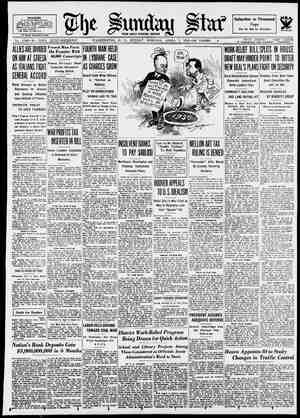Evening Star Newspaper, April 7, 1935, Page 85
You have reached the hourly page view limit. Unlock higher limit to our entire archive!
Subscribers enjoy higher page view limit, downloads, and exclusive features.
THIS WEEK Shorthand of 500 B.C. Smuggled from an Egyptian tomb, a key to the ancient Greeks’ shorthand now promises to decipher ancient texts that have been mysteries since the days of Socrates U 1S intent, blue scholar’s eye gleamed spectacles, and he turned from his notebook, covered with the neat, tiny writing of the bibliognost, to finger the pages of the Milne manual of Greek short- hand. Here at last was the key to those mysterious symbols written on stone, wax tablets and papyri, whose meaning has eluded the most patient and erudite savants ever since they were recovered from the tombs and sands of old Egypt. Shorthand! 1 perceived, as 1 talked with H. J. M. Milne, Assistant Keeper of the De- partment of Manuscripts, British Museum, that I had erred in dismissing the subject as a dull one starting in a business college textbook and ending in a slim stenographer dreaming of marrying the boss’s son. Shakespeare, the Church Fathers, Caesar, Pericles . . . lost civilizations and immortal names glimmered in the shorthand pattern, and lived again. Romance and magic and mystery were in it; and now the thrill of a newly-discovered key to enable men to read at last the secret writing of the ancient Greeks. Where and when shorthand began is any- body’'s guess. Some say the Egyptians in- vented it, because of their threefold form of Others attribute it to the Hebrews, owing to their mode of writing by consonants, omitting the vowels and describing words by initials only. We know that the American systems de- rive from the English; but was the English system an original invention, or did the Romans borrow from the Greeks and carry the knowledge into old Britain? Was it there passed from satrap to slave, from scholarly abbot to toiling monk, until the literary pirates who sat in the Elizabethan theater and took down the dialogue of Shakespeare’s plays in shorthand, although they thought they had devised their own systems, really owed something to the pioneers of the ancient world? Nobody knows. Only two things are sure. One is that if you present man with the prob- lem of capturing spoken words before they escape and are lost forever, he will solve that problem. The other is that from the root of the shorthand idea innumerable systems can shoot. 3 Benjamin Franklin talks of being instructed in shorthand by an uncle, a tanner in London who had invented his own system. Bernard Shaw, ever the rugged individualist, finds no system so good as the one he devised and uses, his brain moving faster than he can write longhand. Pepys wrote his famous diaries in shorthand (he had hundreds of sys- tems to choose from then). Shorthand has, indeed, intrigued many great minds. Dickens wrote Wilkie Collins: *‘. ... 1 dare say I am at this present writing the best shorthand writer in the world.” John Byron, first of the modern dialect poets, was also founder of the first shorthand society and inventor of the system which John Wesley used to write his diaries. And then there was Cicero himself was adept at shorthand. It was he who introduced notarss trained in shorthand reporting into the Senate (as Plutarch records) on that momentous day, December 6, 63 B.C., when the Senators de- bated the fate of Cataline and his fellow con- spirators. We owe to this initiative of Cicero’s the only oration of Cato the Younger that has come down to us; also that great speech of Caesar’'s which contains the Caesarian view, long before the dawn of Christianity, on the immortality of the soul: “So far as the question of the penalty is concerned, indeed, we are able to say this, as the matter stands, that in grief and care, death is a relief from affliction, and not a punishment ; that it eliminates all the miseries of mortals, and that beyond its bourne there is no place either for sorrow or joy.” We know all about Roman shorthand from contemporary references. But the Romans had only transferred a Greek invention to their own use. Where was the key to the system used in the older and more advanced ddad s civilization to take down the discourses of the ~ Phoro Courresy Egypt Exploration Socety Iilussration by Kemp Starrett poets, philosophers, and politicians, whose L authors seldom committed them to writing? Long before the day of the modern stenographer, the Greeks had a shorthand system Apparently it had failed to survive the pas- : S : sage of the centuries; and for generations Above—Part of the ancient papyrus that enabled scientists to read it
